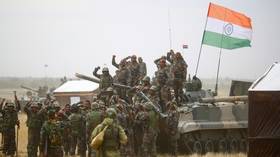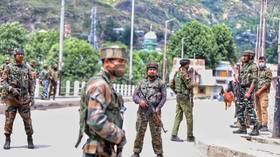The Indus Water Treaty has withstood wars, border skirmishes, and diplomatic breakdowns. Following the Kashmir attack that killed 26 people, tensions between New Delhi and Islamabad risk spiraling into a full-blown water conflict
Following the killing of 26 people in Baisaran Valley in Jammu and Kashmir, one of the deadliest terrorist attacks targeting civilians in India, New Delhi has announced the suspension of the decades-old Indus Water Treaty that governs water sharing with Pakistan.
“Recognizing the seriousness of this terrorist attack, the Cabinet Committee on Security decided upon the following measures. The Indus Waters Treaty of 1960 will be held in abeyance with immediate effect until Pakistan credibly and irrevocably abjures its support for cross-border terrorism,” Indian Foreign Secretary Vikram Misri announced on April 23.
Indian Jal Shakti (Water Resources) Minister CR Patil said New Delhi would ensure “not a drop of water” flows to Pakistan, describing the decision as being in “the national interest.”
“The historic decision taken by the Modi government on the Indus Water Treaty is completely justified. We will ensure that not even a drop of water from the Indus River goes to Pakistan,” Patil said.

Islamabad has denied any involvement in the April 22 attack, and has warned that any attempt to block or divert its water share would be treated as an “act of war.”
Former Pakistani Foreign Minister Bilawal Bhutto-Zardari issued a stern warning: “The Indus is ours and will remain ours. Either our water will flow through it, or their blood will.”
While India’s move raised political temperatures, experts say the immediate practical impact may be limited. Nevertheless, the symbolic significance of the step – and the risks it carries – are being deeply felt. Locals in border regions of Pakistan are particularly worried that it could trigger a major water crisis in the country, further deepening its economic struggles.
What is the Indus Water Treaty?
Signed in 1960 under the patronage of the World Bank, the Indus Waters Treaty (IWT) governs the sharing of the Indus River system between the two nations. Under the treaty, Pakistan has rights over three western rivers – the Indus, Jhelum, and Chenab – while India retains rights over the eastern rivers – Ravi, Beas, and Sutlej.

India can use the western rivers for “non-consumptive purposes” such as hydropower generation, but is prohibited from altering the flow or significantly storing water. The treaty cannot be altered or abrogated unilaterally, and any change can be enforced only after mutual agreement.
Experts on both sides point out that India cannot immediately block or unilaterally alter the water flows without breaching the treaty unless formally abrogated – a process not yet initiated.
However, the suspension signals a possible shift, with New Delhi gradually tightening the screws through measures such as a series of small, legal hydropower projects, which could over time reduce water availability for Pakistan’s agricultural heartlands. India has historically underutilized its full water share under the treaty.
The suspension grants India greater freedom to manage the river flows. While India has long expressed dissatisfaction with the existing framework and pushed for renegotiations, both countries have remained locked in disputes at the Permanent Court of Arbitration in The Hague, particularly over the Kishenganga and Ratle hydroelectric projects, where disagreements over the permissible size of water storage facilities have become a persistent source of tensions.
What could the impact be on Pakistan?
The suspension of the IWT has raised alarm in Pakistan, where over 80% of agricultural land depends on the Indus River system and the suspension could seriously threaten the country’s agricultural sector and food security in general.
As one of the world’s most water-stressed countries, Pakistan relies heavily on the Indus for agriculture, drinking water, and energy generation. A suspension could trigger crop failures – particularly of staples like wheat, rice, and cotton – and worsen existing crises, which have already fueled unrest, such as the 2021 Karachi water riots.
Zahid Choudhary, a farmer from Punjab, Pakistan, remembers the devastating drought of 2018. “If India stops the water,” he says, “we will starve in the dry season and will be forced to flee.”

While Pakistan may turn to international courts, the move could escalate support for anti-India militants. Water has always been a point of tension and now with the IWT suspension, the stakes are even higher and could result in a full-blown military conflict.
Environmental researcher Arif Shakeel says the suspension could also shift flood management dynamics. “During heavy floods, Indian authorities may choose to release excess water downstream toward Pakistan rather than risk inundation on their side of the border, effectively using river flows as a strategic tool,” he added.
Furthermore, under the treaty, India was obligated to share vital hydrological data that helped Pakistan predict floods and plan irrigation cycles effectively. Shakeel said that with the treaty suspended, India is no longer legally obligated to provide this information, leaving Pakistan dangerously exposed during monsoon seasons.
For over 60 years – through wars, near-conflicts, and diplomatic breakdowns – the treaty endured.
“Water, unlike much else in the India-Pakistan relationship, remained predictable. That predictability is now in serious doubt,” said Hassan F Khan, a Pakistan-based analyst.
He emphasized that the western rivers are not merely shared resources but are Pakistan’s primary water lifeline.“While long-term reforms may be possible, there is no immediate substitute. These rivers sustain lives, livelihoods, and landscapes. Pakistan cannot afford to let them become collateral in a political confrontation,” he said.
Why is Kashmir central to the water crisis?
Kashmir has for decades been the main point of contention between the two countries, which have fought two of their three wars over the region. As tensions mount again, Kashmir’s strategic importance in the Indus River system is coming sharply into focus.
A large stretch of the river network – including major tributaries like the Jhelum and Chenab – runs through Jammu and Kashmir before entering Pakistan. This geography could fuel new political narratives, especially in Pakistan, where the idea of India “blocking” water supplies may become a point of anger.
“The perception that Kashmir holds the key to Pakistan’s water security could gain fresh ground,” an observer said.
The roots of this complex water-sharing issue go back to the 1947 partition, when British India was divided, and so was the princely state of Jammu and Kashmir – setting the stage for decades of conflict over territory and resources.
Following the suspension of the IWT by New Delhi, the region’s waters, long seen as a shared lifeline, have become another flashpoint. Analysts warn that the fallout could deepen distrust and reshape the political rhetoric in both countries, with Kashmir once again at the center of it all.

Since 2006, both countries have sparred over India’s decision to construct two power projects in Jammu and Kashmir – the 330-megawatt Kishanganga project on the Jhelum river and the 850-megawatt Ratle project on the Chenab river.
While the Kishenganga power project was inaugurated in 2018, the Ratle dam is under construction. Environmental researcher Aisha Jan warned that altering river flows could backfire. “If India blocks the Chenab, then releases water during monsoon, floods risks in many areas of Kashmir could itself surge,” she said.
Cautious approach
Despite the escalating rhetoric, experts note that India has not formally withdrawn from the treaty – something the IWT does not permit unilaterally. Analysts suggest India’s suspension is more strategic than substantive at this stage, aimed at giving New Delhi more flexibility.
However, some caution remains. “Upstream countries must remember they can themselves become downstream,” one expert said, referencing India’s own vulnerabilities in the Brahmaputra basin vis-à-vis China.
Dr Mohmad Waseem Malla, research fellow, International Center for Peace Studies, New Delhi, said India’s move represents a fundamental recalibration in its bilateral approach towards Pakistan. “New Delhi appears determined not to exercise strategic restraint if Pakistan continues support for destabilizing actors,” Malla said.

He emphasized, however, that India’s infrastructure is not yet capable of executing large-scale hydro-coercion. He said that beyond the performative aspect of India’s actions that aim at signaling to Pakistan – and domestic audiences – there is a substantive aspect to this response. “India’s move must be understood in the context of longstanding dissatisfaction with the IWT’s distributional framework,” he stated.
India has increasingly argued that the treaty, concluded in 1960, disproportionately favors Pakistan, which enjoys de facto control over approximately two-thirds of the waters from the six-river Indus system.
“In this light, the suspension experts said that it can be viewed as an opening gambit aimed at creating diplomatic space for the renegotiation of the Treaty, taking into account evolving needs, hydrological realities, and strategic calculations,” Malla said.
In 2018, a study by the European Commission’s Joint Research Center (JRC) identified several global regions where tensions over shared water resources could escalate into conflicts. Five river basins were deemed especially at risk.
As India and Pakistan trade water threats and bolster military postures, a deep sense of unease has gripped the villages near the Line of Control (LOC) in north Kashmir’s Uri village in Baramulla district. “First, there was a fight over land, now the water is worse,” said Muhammad Lateef, a local resident from Uri.“If one side starves the other, it won’t end with talks. The borders might heat up again.”
#decadesold #deal #falling #nuclear #neighbors #involved #India













Leave a Reply